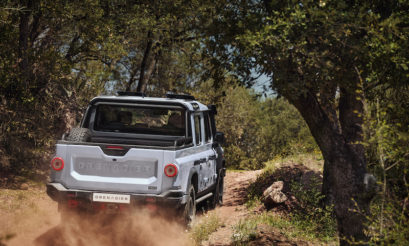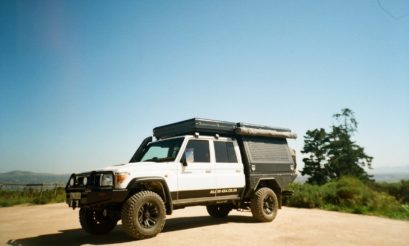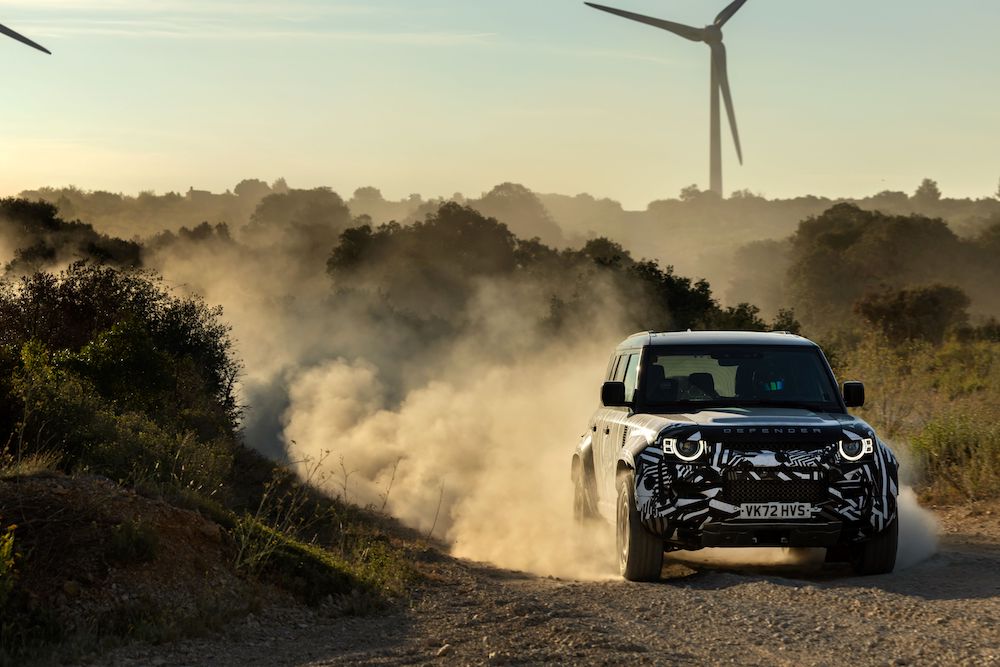In the late Fifities, Mozambique was still a Portuguese colony, tourism to the region was a world removed from the commercial bustle it is today. Back then a 21-day holiday on Paradise Island cost a group of students the equivalent of R40 each. This is how they did it.
Text: Lex Smuts Photographs: Lex Smuts and friends
During the late 1950s the Exploration Club at the University of Pretoria was involved in organising an annual “Skindiving and Spear-fishing” trip to Mozambique coast during the winter holidays. The intention was to accommodate a group of 20 or more students on one of the coastal islands for about three weeks, camping, swimming and diving to their hearts’ content.
The logistics to achieve this seemed quite extensive and costly, even in those days. Yet the opposite proved true and the event began to draw students from as far away as Rhodes, Cape and Natal universities.
To me the most memorable holiday was the trip to Margaruque Island, near Bazaruto, in 1959. I was on the executive committee of the club at that ti me and thus have sharper memories than usual of the trip.
Transport proved the least of our worries. This was due to a fortuitous collection of incidents that provided an unusual and very successful solution. A Mr Gradwell of Gradwell Storage and Long Distance Removals offered a pantechnicon for the journey. We only had to pay for the diesel.
Mr Gradwell, himself a keen fisherman, visited his friend Joaquim Alves every year at this time for a fishing holiday. Mr Alves just happened to be the resident millionaire in Vilanculos and the owner of the hotel on Paradise Island.
Vilanculos was the nearest “harbour” to Bazaruto and, after negotiations, Mr Alves provided a campsite, tents, beds and other facilities for the three weeks on the nearby island of Margaruque.
Prior to the departure for the island there was a scurry of activity as equipment was obtained and prepared. A 12-man dingy was “borrowed” from contacts in the military, who kindly turned a blind eye for the loan period.
Spear-fishing and diving equipment was the responsibility of the students and as this was before the age of commercial aqualungsetal most was rather primitive and oft en home-made.
Agreement was reached with the medical department at the University of Pretoria, who supplied a comprehensive fi rst aid kit and a medical student to go with it, as well as surgical rubber for the spearguns.
The marine biology section, not to be outdone, supplied the defi niti ve fi sh book by a Professor Smith, and a series of experiments they wished to be conducted.
The amount and variety of food required was carefully calculated, with a generous allowance for the many fish we were going to catch.
Departure day arrived and all cargo was loaded as near to the front of the cargo-hold of the van as possible. Aft er the usual last minute panic, a safety net was fitted over the open loading door and with the Gradwell party manning the cabin, all the students were bundled into the remaining space in the cargo hold and we were off .
The trip down to “LM” (now Maputo) was unusual, to say the very least. Imagine a furniture van full of students stopping at a roadside café or garage with plenty of urgent requirements. Every stop was an adventure of its own.
The journey itself was spent talking, singing (one of the students had a guitar), playing cards, reading, sleeping in one of the several hammocks slung at the rear of the van, or just lying around.
The Portuguese officials at the Komati poort border where we would spend the night.
Our arrival at the campsite in LM caused quite a sensation. The officials did not agree that a furniture van was a camping vehicle and it was only aft er outside help was called in through local contacts that we were allowed to park near the ablution blocks. Accommodation was arranged for the ladies, everyone did their necessities and we headed for town. For this purpose extra buses were required to transport our entire party to town.
We had decided earlier to always stick together as a group but this had a marked effect at every eating establishment we visited. Many and varied were the reactions. A few even bluntly refused to let us in, especially towards the end of the evening.
Others obviously saw a fortune in the making, considering how much students can eat and drink. After the mandatory visit to the famous (infamous?) nightclubs we headed back to the campsite. The buses had ceased to run, there was a scarcity of taxis and we had no option but to walk the five kilometres back to camp.
Our noisy progress was bound to attract attention and very soon the police arrived in two squad cars to investigate. Fortunately they saw the humour of the situation and escorted us back to camp.
The next morning we boarded the van and headed north on a good tar road to our next stop at Xai-Xai where we would lunch at a recommended eatery. Aft er an uneventful journey we arrived at our destination.
The effect of such a large crowd of unexpected customers had the restaurant owner in a fit. Muttering curses he ran around shouting at all and sundry. Fortunately he was pacified by his wife and, with help called in from the local populace, a really excellent Portuguese fish-and-prawn meal was provided.
Lunch completed, everyone involved in the lunch posed by the van for photos, waved farewells and we were off to Vilanculos on two strips of tar road that proved adequate – except for when there was oncoming traffic. That needed some manoeuvring. Nobody, however, was inclined to argue with a truck full of students.
A relaxed and pleasant trip saw us arrive at Vilanculos, where we met up with the first of the two pre-arranged groups that would join us on the island: members of the Transvaal Underwater Research Group (TURG), some with their families. The TURG crowd would instruct us on the do’s and don’ts of marine life, what to touch and what not to, and what to look out for.
The night was spent sleeping wherever we could find space and early the next morning the other group arrived. They were from the well-known skindiving club in East London, the “Dolphins”, and were experts on free-diving and spear-fishing techniques.
Although they would not join us at the camp on the island, they were to camp nearby and would spend quite a lot of ti me with us. The Dolphins proved their expertise by spearing a 30 pound grouper fish within their first hour at the harbour, even before we had finished unpacking the van. The “30 pound” figure is significant as the only scale we had was a handheld one with a maximum reading of 30 pounds (13,6kg).
The boat that was to take us to the island arrived, manned by a crew neatly dressed in white with the emblem JA (for Joaquim Alves) embroidered on their pockets. We boarded with great enthusiasm and activity and set off on the last leg to Margaruque, where we arrived later that afternoon to claim our tents.
A supper was generated from all the left overs and scraps available and with all of us feeling a bit tired aft er an eventful couple of days, we went to our tents early in the evening to prepare ourselves for the 16 days to come.
The sun rose on the first of many perfect days and we all met for breakfast at the wooden chairs and tables under canvas awnings, which was to serve as the central meeting and eating place for the rest of our visit.
Duties were identified and allocated; everybody advised of the few necessary rules and we were free to head into the great unknown. We were the only people on the island and except for a structure protecting a freshwater spring no other sign of people existed.
We soon discovered that the tide would flow past the campsite from left to right in the early morning, and then right to left after lunch. This proved ideal for the military dingy, which was launched early in the morning, manned by all those wishing to dive and all their equipment. They would drift approximately one mile (1,6km) down the reef, hover for about an hour for lunch then, as the tide turned, drift all the way back to the camp with no significant rowing required. It became so popular that places had to be booked in advance.
Meals became an adventure in themselves, prepared for us by a local cook who had international experience, lent to us by Mr Alves. He claimed in his own words to “name any language, I cook it”!
Every form of seafood received attention as the cook regarded it a challenge to make a meal of anything we could present to him. Thus I had the opportunity to enjoy a giant clam steak cooked in port, something very few people in the world have experienced and even fewer will in future as the giant clam is very rare nowadays.
Aft er about 14 days the strictly seafood diet became a little too much and a group of us decided to hitch a ride to the next door island, Benguerra, on the fishing boat that regularly brought provisions.
The sole purpose was to obtain some chickens and perhaps a goat from the local populace. The Benguerra Trading Company was formed with Eddie Barlow, a fellow student who became one of South Africa’s most successful cricketers, elected as representative head.
On Benguerra we got to know a local brew made from the fermented palm juice. This beverage tastes like a flat and diluted ginger beer, but has a delayed kick that became evident when we were chasing chickens through the undergrowth.
Aft er a hilarious morning we arrived back with new provisions and several hangovers.
The days were spent swimming, diving, going for long walks around the island, playing cards, sleeping, playing cricket with a shaved down palm frond and tennis ball on the tide flats, or just lazing about.
It was during these cricket games when I dismissed Eddie Barlow on several occasions, something I often casually mention in relevant conversations.
The marine biology exercises became a popular activity and much ti me and energy was spent on identifying fish by their “dorsal and anal spines and fins”.
Various strange creatures were studied and observed that we did not even know existed. This is where I discovered that the feared scorpion fish is really harmless and can easily be made friends with, to the extent of hand-feeding him. On the opposite side of the coin were the moray eel, which was aggressive, had very sharp teeth and should be avoided, and the stone fish, which can penetrate a tennis shoe with his poisonous spine.
All too soon departure day arrived and unsurprisingly a gloom sett led on the group. It was a quiet and dejected group that gathered on the beach to await the boat to Vilanculos.
We were so immersed in reminiscing that the trip back to Pretoria went very quickly and without incident, and actually proves difficult to remember. A quick stop in “LM” and without any other events of note we were back home aft er 21 days of unforgettable holidaying.
The costs? Not counting personal expenditure such as alcohol and gifts, the whole trip cost R40 per person. This is about R300 in comparable purchase power, today.
The wonder of the occasion was not that we did it, but that it could be done. There is serious doubt that any similar venture today would not be subjected to “how much can we make out of it” and in the process destroy the real enjoyment of such a trip.








